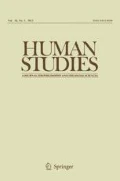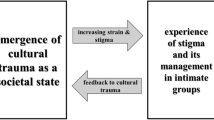Abstract
This article will examine the emergence of a distinct bourgeois identity in modernity which differentiated itself from comparable social groups through its desire to exert ‘virtuous’ control through engagement with reform and philanthropy, and through the symbolic construction of a transgressive, socially marginal but redeemable other as subject of this reform. The ontological insecurities of late modernity had a profound impact on the sources of bourgeois identity, and this article will explore the emergence of the cultural omnivore as a new form of social distinction which is no longer virtuous, but is still a manifestation of the desire to express identity through demonstrating control. It will outline the impact of the emerging omnivore on relationships between the bourgeois self and the marginal/deviant other, particularly in terms of the extent to which the reconceptualisation of ‘other’ as cultural univore exacerbates the exclusion and criminalisation of the marginalized other.
Similar content being viewed by others
References
Adam, T. (2009). Buying respectability: philanthropy and urban society in transnational perspective, 1840–1930. Bloomington: Indiana University press.
Adorno, T., & Horkheimer, M. (2002). Dialectic of enlightenment; philosophical fragments. Stanford: Stanford University Press.
Arnold, M. (2002). The complete prose works of Matthew Arnold: Volume 10—Philistinism in England and America. Michigan: Michigan University Press.
Balibar, E. (2002) ‘Possessive individualism’ reversed: From Locke to Derrida. Constellations, 9(3).
Bauman, Z. (2001). The individualised society. Cambridge: Polity Press.
Benjamin, W. (1999). ‘The work of art in the age of mechanical reproduction’ in Illuminations. London: Pimlico.
Bourdieu, P. (1966). The sentiment of honour in Kabyle society. In J. G. Peristiany (Ed.), Honour and shame: The values of Mediterranean Society. Chicago: Chicago Univ Press.
Bryson, B. (1996). “Anything but heavy metal”: Symbolic exclusion and musical dislikes. American Sociological Review, 61(5), 884–899.
Bryson, B. (1997). What about the univores? Musical dislikes and group-based identitiy construction among Americans with low levels of education. Poetics, 25, 141–156.
Demerath, L. (2002). Epistemological culture theory: A micro theory of the origin and maintenance of culture. Sociological Theory, 20(2), 208–226.
Emsley, C. (1996). Crime and society in England, 1750–1900. London: Macmillan.
Foucault, M. (1977). Discipline and punish: The birth of the prison. London: Allen Lane.
Garland, D. (2001). The culture of control: Crime and social order in contemporary society. Clarendon: Oxford University Press.
Gatrell, V. (1993). Crime, authority and the policeman-state. In F. Thompson (Ed.), The Cambridge Social History of Britain (Vol. 3). Cambridge: Cambridge University Press.
Giddens, A. (1991). Modernity and self identity—self and society in the late modern age. Cambridge: Polity.
Gripsgrud, J., Hovden, J., & Moe, H. (2011). Changing relations: Class, education and cultural capital. Poetics, 39, 507–529.
Hayward, K., & Yar, M. (2006). The ‘chav’ phenomenon: Consumption, media and the construction of a new underclass. Crime, Media, Culture, 2(1), 9–28.
Hendler, G. (2001). Public sentiments: Structures of feeling in 19th century American literature, University of North Carolina Press.
Jones, O. (2011). Chavs: The demonisation of the working class. London: Verso.
Kidd, A. (1999). State, society and the poor in 19th century England. Houndmills: MacMillan.
Kidd, A., & Nicholls, D. (1999). Gender, civic culture and consumerism: Middle-class identity in Britain, 1800–1940. Manchester: Manchester University Press.
Lahire, B. (2008). The individual and the mixing of genres: Cultural dissonance and self-distinction. Poetics, 36, 166–188.
MacCabe, C. (1974). Realism and the cinema: Notes on some Brechtian theses. Screen, 15(2).
MacPherson, C. B. (1962). The political theory of possessive individualism. Oxford: Oxford University Press.
Marx, K. (1973). Grundrisse. Foundations of the Critique of Political Economy. Harmondsworth: Penguin.
Nochlin, L. (1971). Realism. Harmondsworth: Penguin.
Ollivier, M. (2008). Modes of openness to cultural diversity: Humanist, populist, practical, and indifferent. Poetics, 36, 120–147.
Peterson, R. (1997). The rise and fall of high brow snobbery as a status marker. Poetics, 25, 75–92.
Peterson, R., & Kern, R. (1996). Changing highbrow taste: From snob to omnivore. American Sociological Review, 61, 900–907.
Peterson, R., & Simkus, A. (1992). How musical tastes mark occupational status groups. In M. Lamont & M. Fournier (Eds.), Cultivating differences: Symbolic boundaries and the making of inequality. Chicago: Chicago University Press.
Pfeil, F. (1990). Making flippy floppy: Postmodernism and the baby-boom PMC. In Another tale to tell: Politics and narrative in postmodern culture. London: Verso.
Read, J. (2010). The production of subjectivity: From transindividuality to the commons. New Formations, 70, 113–131.
Sennett, R. (1999). The corrosion of character: Personal consequences of work in the new capitalism. New York: Norton and Co.
Sennett, R. (2007). The culture of the new capitalism. New Haven: Yale University Press.
Simmel, G. (1950). The metropolis and mental life. In K. H. Wolff (Ed.), The sociology of Georg Simmel. New York: Free Press.
Simmel, G. (1971). The transcendent character of life. In D. Levine (Ed.), On individuality and social forms—selected writings. Chicago: Chicago University Press.
Skeggs, B. (2004). Class, self, culture. London: Routledge.
Tampubolon, G. (2008). Revisiting omnivores in America circa 1990s: The exclusiveness of omnivores? Poetics, 36, 243–264.
Veblen, T. (1953). The theory of the leisure class—an economic study of institutions. New York: New American Library.
Warde, A., & Gayo-Cal, M. (2009). The anatomy of cultural omnivorousness: The case of the United Kingdom. Poetics, 37, 119–145.
Warde, A., Wright, D., & Gayo-Cal, M. (2007). Understanding cultural omnivorousness: Or the myth of the cultural omnivore. Cultural Sociology, 1(2), 143–164.
Warde, A., Wright, D., & Gayo-Cal, M. (2008). The omnivorous orientation in the UK. Poetics, 36(2–3), 148–165.
Williams, R. (1973). The country and the city. London: Chatto and Windus.
Williams, R. (1977). Marxism and literature. Oxford: Oxford University Press.
Young, J. (1999). The exclusive society. London: Sage.
Author information
Authors and Affiliations
Corresponding author
Rights and permissions
About this article
Cite this article
Kearon, T. From Arbiter to Omnivore. The Bourgeois Transcendent Self and the Other in Disorganised Modernity. Hum Stud 35, 383–399 (2012). https://doi.org/10.1007/s10746-012-9241-1
Published:
Issue Date:
DOI: https://doi.org/10.1007/s10746-012-9241-1




